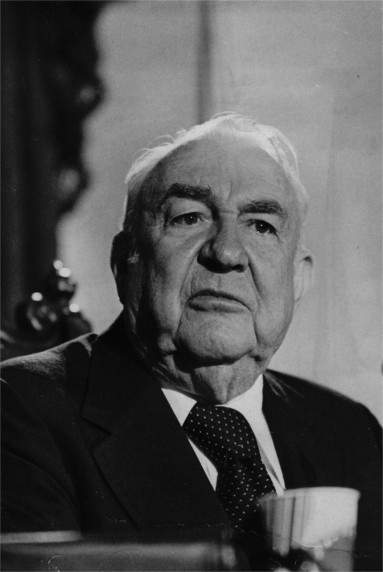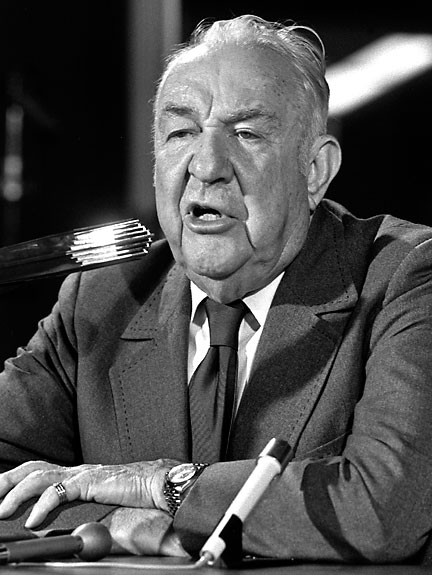Sam Ervin (Samuel James Ervin)

Sam Ervin was serving as an associate justice of the North Carolina Supreme Court when he was appointed in June 1954 by Governor William B. Umstead to fill the U.S. Senate seat of Clyde Hoey, who had died in office. He ran successfully for the seat in November 1954. Ervin made a deep impact on American history through his work on two separate committees at the beginning and ending of his career that were critical in bringing down two powerful opponents: Senator Joe McCarthy in 1954 and President Richard M. Nixon in 1974. In 1954, then-Vice President Richard Nixon appointed Sam Ervin to a committee formed to investigate whether McCarthy should be censured by the Senate. The Senate Select Committee to Investigate Campaign Practices, which investigated Watergate, was popularly known as the “Ervin Committee”. In 1956, Senator Ervin helped organize resistance to the 1954 Brown v. Board of Education Supreme Court decision calling for desegregation of schools by drafting The Southern Manifesto; this influential document encouraged defiance of desegregation and was signed by all but a few of the Southern members of Congress. (In his autobiography, Preserving the Constitution, Ervin said he later changed his mind on the Brown decision, stating that the decision, to the extent it eliminated mandatory segregation, was correct, but that forced integration, required under later decisions, was improper.) Defenders of Ervin argue that his opposition to most civil rights legislation was based on his commitment to the preservation of the Constitution in its pristine formulation that he repeatedly stated encapsulated civil, human and equal rights for all. There is little if any evidence that he engaged in the racial demagoguery of many of his Southern colleagues. Some historians consider Ervin’s position to be one of “cognitive dissonance” because he opposed federal legislation to combat race-based discrimination, but did not do so in harsh, ugly terms. While he once maintained that Americans were entitled to “their prejudices as well as their allergies”, he did not seem to be motivated by prejudice himself, but more by his suspicion of federal power. Ervin said he didn’t like what the Warren Court “has done to the Constitution”.
Sam Ervin was also a staunch opponent of the Immigration and Nationality Act of 1965 which abolished nationality quotas beginning in 1968. He felt that the principle of tying allowed numbers of immigrants from a given country to the number of people who had ancestral origins in that country and lived in the United States should be retained. Meanwhile, Ervin’s strict construction of the Constitution also made him a liberal hero for his support of civil liberties, his opposition to “no knock” search laws, and the growing intrusions of data banks and lie-detector tests as invasions of privacy. In 1966, Senator Ervin played a major role in the defeat of Sen. Everett Dirksen’s Constitutional amendment to allow prayer in public schools. Ervin also favored the exclusionary rule under the Fourth Amendment, which made illegally seized evidence inadmissible in criminal trials. When the Senate voted on the Equal Rights Amendment in 1971, Ervin proposed an amendment that would exempt women from the draft; Ervin’s amendment to the ERA overwhelmingly failed. However, he was a staunch opponent of the ERA and after it passed the Senate Ervin used his influence to dissuade the North Carolina General Assembly from ratifying it, maintaining that it was the “height of folly to command legislative bodies to ignore sex in making laws”.
Sam Ervin got his start in investigative matters, even before Watergate, when in January 1970 it was revealed by Christopher Pyle, an investigator for Ervin’s Judiciary Subcommittee on Constitutional Rights, that the U.S. Army was performing domestic investigations on the civilian population. Ervin’s further investigations on the matter over the following years, together with the Church Committee inquiries, led to passage of the Foreign Intelligence Surveillance Act (after Ervin had left office). Ervin gained lasting fame through his stewardship of the Senate Select Committee to Investigate Campaign Practices, also known as the Senate Watergate Committee, from the 1972 presidential election. Senate Majority Leader Mike Mansfield chose Ervin because it was unlikely Ervin was going to run for re-election in 1974 (and in fact did not), because he had no aspirations beyond his office, because of his knowledge of the law and the Constitution, and because he was an even-keeled, conservative, independent-minded Democrat. President Nixon thought at first that Ervin might potentially be partial to him, but that turned out to not be the case.
Sam Ervin resigned in December 1974, just before his term ended. After retirement, Ervin practiced law, wrote several books, and appeared in various commercials for products. As a lawyer, he served as a co-counsel with Womble Carlyle Sandridge & Rice PLLC on several high-profile cases, including a successful appeal in Joyner v. Duncan. In 1973, Ervin was recorded on CBS Records on the LP record, Senator Sam at Home, which featured tracks of Ervin speaking his mind and telling anecdotes, separated by tracks of him singing popular songs. One of those songs, “Bridge Over Troubled Water” was released as a single, and subsequently appeared on the 1991 compilation album Golden Throats 2. Sam Ervin died in 1985 at a hospital in Winston-Salem, North Carolina, from complications of emphysema. He was 88 years old.
Born
- September, 27, 1896
- USA
- Morganton, North Carolina
Died
- April, 23, 1985
- USA
- Winston-Salem, North Carolina
Cause of Death
- emphysema
Cemetery
- Forest Hill Cemetery
- Morganton, North Carolina
- USA



